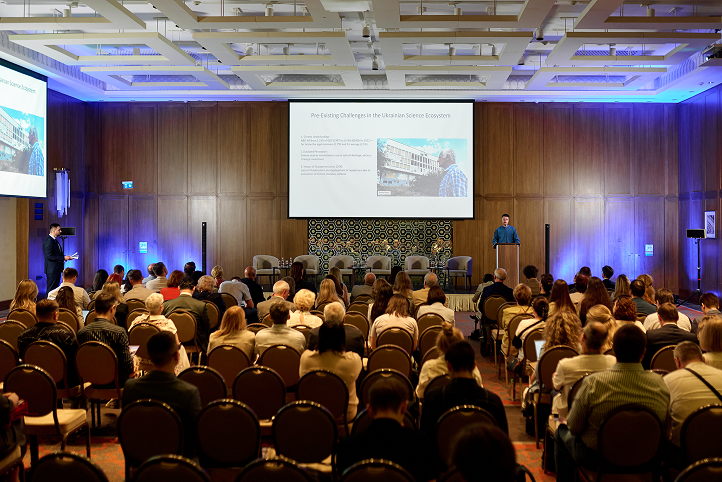

Post-War Infrastructure Recovery: Vitaliy Omelianenko's Blog
03.10.23
Vitaliy Omelianenko is a Doctor of Economics whose interests span the development of innovative policies, technology transfer management, and advancement of high-tech sectors. In the "Science at Risk" project, Vitaliy and his team address the issues surrounding restoring Ukraine's research infrastructure. Their contribution to the White Book focuses mainly on the obsolete, damaged, and destroyed infrastructure undermining the competitiveness of Ukraine's scientific potential. To learn about the latest findings of their research, read his blog.
Research Infrastructures (RIs) are key to the country's development. They provide scientists access to specialized tools, equipment, and laboratories necessary for high-quality research. This fosters the emergence of new ideas, technologies, and innovations that can create novel products, services, and markets. Developed RIs enable a country to actively collaborate with other nations and researchers internationally, facilitating the exchange of knowledge, and experience, and attracting foreign investments and talent.
Investments in research infrastructure are key to the advancement of high-tech sectors that are fundamental to the country's global competitiveness. The development of innovations enabled by these infrastructures can play an important part in attracting new investments, creating jobs, and boosting GDP growth.
Causes of the problem in Ukraine before the full-scale invasion
They were laid out in the concept of the State Targeted Program for the Development of Research Infrastructures in Ukraine for the period up to 2026:
— Prolonged underfunding of the maintenance and modernization of research facilities from state and private sources.
— Aging scientific equipment.
— Lack of flexible mechanisms for reallocating and accumulating funding for the renewal of RIs.
— Absence of systematic development of RIs and priorities in state policy in this area.
— Imperfections in the regulatory framework for the creation and development of RIs.
Among other causes are inefficiencies in the system of shared use of scientific equipment, the absence of a database of RIs in Ukraine, and a system for monitoring their performance; and the slow pace of the process of integration into the European Research Area.
Russia’s war against Ukraine is another important factor. The Russian aggression started in 2014 and resulted in the loss of RIs of the universities and scientific institutions in the Autonomous Republic of Crimea and parts of Donetsk and Luhansk regions occupied by Russia. With the start of the full-scale invasion in 2022, many cities in Ukraine witnessed the destruction, damage, and theft of the RIs by Russia.
As of March 2023, 35% of Ukraine's research infrastructure has been damaged or destroyed, compared to 15% in November 2022 (ERAC Report on the Role of Research and Innovation in Ukraine's Recovery, 2023).
Research of our work group at Science at Risk
Within the scope of the research, efforts of our work group are directed toward:
— Identifying the system of research infrastructure and its elements on the conceptual level and analyzing the state of RIs in Ukraine.
— Reimagining the organization of RI operation and monitoring.
— Summarizing the best global practices and developing proposals for improving the RI system under crises or in case of the total destruction/theft of particular infrastructure objects.
— Determining the strategic principles of international cooperation in RI recovery, including leveraging the capabilities of the European Research Area (ERA).
— Identifying regional aspects of RI development, considering the available human capital and the reintegration factor.
— Drafting proposals to improve the regulatory framework for procurement procedures, transfer, and usage of scientific equipment, and equipment certification.
To achieve the research goals, we synthesized the best models of RI operation through the analysis of scientific publications, analytical documents, and expert commentary; we reviewed the participation of Ukraine's representatives in EU programs and identified opportunities for cooperation and involvement in the EU infrastructure programs.
We also analyzed global experiences in RI development, post-crisis recovery strategies, regional strategies, and modeling. The participants of the research group reviewed the cases of RI renewal in Japan, the USA, Fiji, Australia, Israel, Iran, and India. Besides that, we formulated conclusions for Ukraine: the coordinating role of the state, and the complex approach to the RI renewal.
For more efficient management of the extant and future RIs, we have analysed best RI monitoring practices, including SFRI Monitoring of Research Infrastructures Performance Indicators.
For infrastructure development, it’s advisable to launch competitions for funding from the National Research Foundation of Ukraine under the category of “Development of Research Facilities and Research Infrastructure”, with the involvement of international donors.
What are the results?
Best world practices we have analyzed show that public-private partnerships are a widespread phenomenon in the development of research infrastructure, but the first investments in the RI development were made by the state or structural and other funds available for a given country.
As a result of our preparations, we have developed the concept of key infrastructure management based on sharing centers. The concept is based on the idea that RI recovery cannot occur on an "everyone gets their share" basis.
Plan of actions
It is necessary to identify possibilities for creating an economic cluster based on specific types of technologies (adequate for uniform equipment, devices, working conditions, and types of knowledge). On their basis, it’s important to establish at most 10-15 innovative sharing science and research centers. These centers should cover the strategic innovation directions of science and technology in Ukraine to create conditions for its effective post-war recovery.
The concept's practical implementation will be facilitated by introducing RI management systems (RIMS), which will make it easier for researchers and external users from the sector and industry to identify and get access to RIs. This will allow them to obtain the best research results by using the most suitable equipment, collaborating with leading researchers, and maximizing the utilization of research equipment. During focus groups and interviews, this idea received support.

